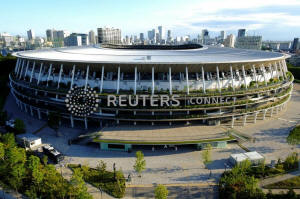Olympics-No spectators at Tokyo 2020 'least risky' option, experts warn
 Send a link to a friend
Send a link to a friend
 [June 18, 2021]
By Sakura Murakami, Rocky Swift and Linda Sieg [June 18, 2021]
By Sakura Murakami, Rocky Swift and Linda Sieg
TOKYO (Reuters) - Japanese medical
experts warned on Friday that holding the Olympics during the
COVID-19 pandemic could increase infections and said banning
spectators was the least risky option, setting the stage for a
possible face-off with organisers.
The experts, led by top health adviser Shigeru Omi, issued their
warning in a report released after Tokyo 2020's organising committee
chief told the Sankei newspaper she wanted to allow up to 10,000
spectators into stadiums for the Games, which begin on July 23.
Japan is pushing ahead with the multi-billion-dollar Games,
postponed last year as the coronavirus was spreading around the
world, despite opposition from the public, worried about another
surge in infections.
Organisers have banned spectators from overseas but have yet to
decide on domestic ones.

Cancellation of the Games - originally intended to showcase Japan's
recovery from a devastating earthquake and nuclear crisis a decade
ago - would be costly for organisers, the Tokyo government, sponsors
and insurers.
"This event is different from ordinary sports events in scale and
social interest and because it overlaps with summer vacations," the
experts said in their report.
"There is a risk the movement of people and opportunities to
interact during the Olympics will spread infections and strain the
medical system."
They said that holding the Games without spectators was the "least
risky" option and desirable.
The final decision will be taken at a meeting as early as Monday
between organisers, including Tokyo 2020 and the International
Olympic Committee, and representatives from the national and Tokyo
governments.
Tokyo 2020 head Seiko Hashimoto told the Sankei newspaper in an
interview published on Thursday she wanted the Games to be with
spectators, and would head into the meeting with that in mind.
The advice from Omi would inform talks with the IOC and others, she
said.
In a sign preparations are moving ahead, athletes from Uganda were
due to arrive on Saturday, Kyodo news reported.
'NOT NORMAL'
Prime Minister Yoshihide Suga's government decided on Thursday to
end emergency coronavirus curbs in nine prefectures including Tokyo
while keeping some "quasi-emergency" restrictions.
While Omi said no spectators was the most desirable option, his
experts have floated the possibility that events could have up to
10,000 fans, but only in areas where the "quasi-emergency" measures,
such as shorter restaurant hours, have been lifted.
[to top of second column]
|

A general view of the Olympic Stadium
(National Stadium) in Tokyo, Japan June 17, 2021. REUTERS/Pawel
Kopczynski

Tokyo is scheduled to be under such
restrictions until July 11. The current state of emergency, the
third since April last year, expires on June 20.
The lifting of previous emergencies has been followed by increased
infections and strains on hospitals.
Organisers should be prepared to act swiftly to ban spectators or
declare another state of emergency if needed, the experts said. If
spectators are allowed, rules should be strict, such as limiting
fans to local residents, the experts said.
Omi, a former World Health Organisation official, has become
increasingly outspoken about the risks from the event. He told
parliament this month it was "not normal" to hold the Games during a
pandemic.
Other Japanese health experts and medical organisation have been
much more vocal, calling for the Games to be cancelled outright.
PUBLIC CONCERNED
The public remains worried. Some 41% of people want the Games
cancelled, according to a Jiji news poll released on Friday. If the
Games go ahead, 64% of the public want them without spectators, the
poll found.
One of the signatories of Omi's recommendations, Kyoto University
professor Hiroshi Nishiura, said he believed cancelling the Games
would be best, but the decision was for the government and
organisers.
"If the epidemic situation worsened, no spectators and cancelling
the Games in the middle (of the event) should be debated," he told
Reuters.

Japan has not experienced the explosive COVID-19 outbreaks seen
elsewhere but a recent surge and an initially slow vaccinations
rollout prompted concerns about strains on the medical system.
The country has recorded more than 776,000 cases and over 14,200
deaths, while just 15% of its population has had at least one
COVID-19 vaccination.
(Additional reporting by Antoni Slodkowski; Writing by Linda Sieg
and David Dolan; Editing by Lincoln Feast, Robert Birsel)
[© 2021 Thomson Reuters. All rights
reserved.]
Copyright 2021 Reuters. All rights reserved. This material may not be published,
broadcast, rewritten or redistributed.
Thompson Reuters is solely responsible for this content.
|